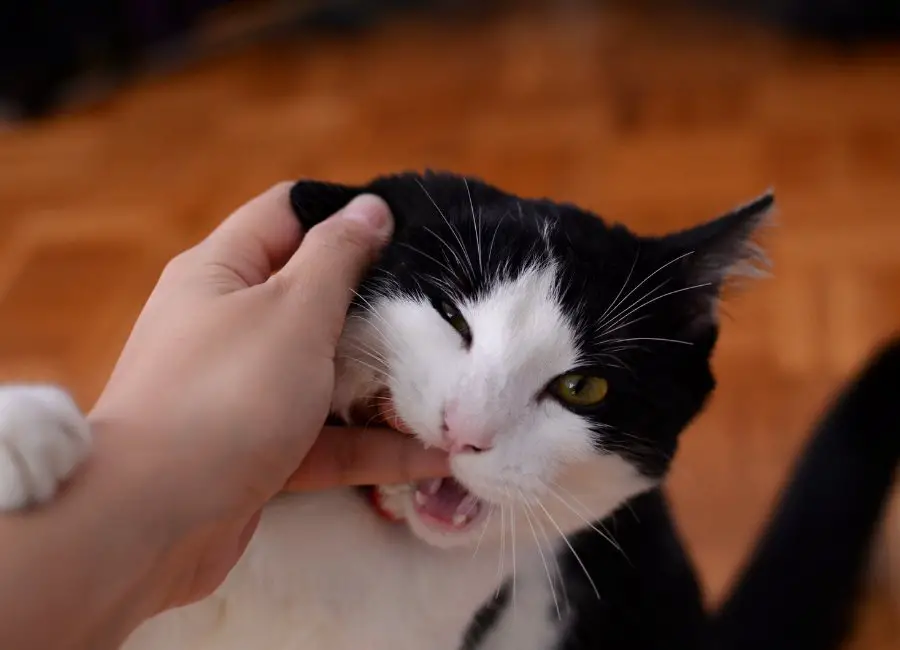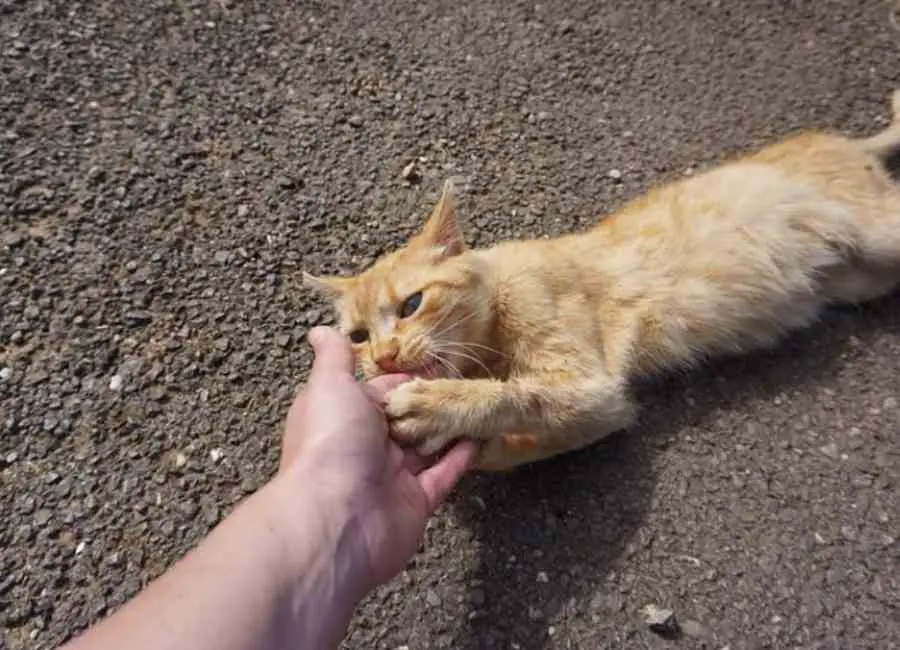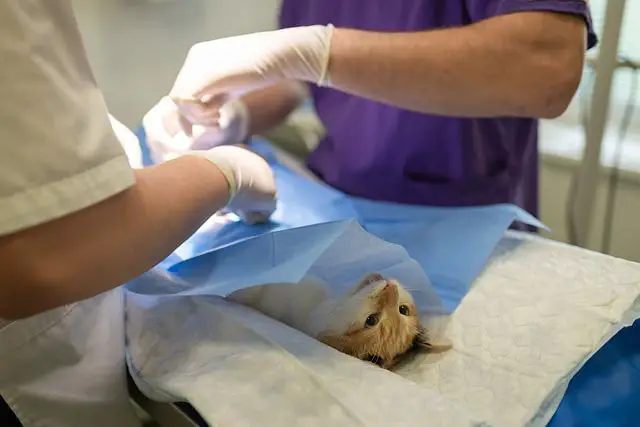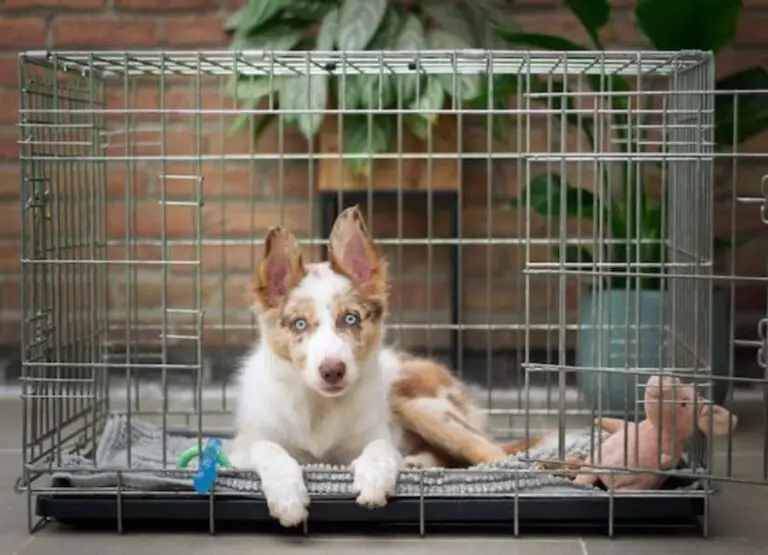Why Do Cats Bite (13 Reasons & Helpful Tips)

Cat lovers are always asking why do cats bite, and this is exactly what we will be discussing in this post.
As a big fan of cats, I have lived with cats and I understand that it hurts when your cat bites you.
This is most times not on purpose, sometimes it could mistake and some other time It’s for fun.
Without wasting your time let me quickly discuss why cats bite…
Why do cats bite
Cats bite for various reasons, including to initiate play, to show aggression, out of fear, when they need attention, or to defend themselves.
All cats have a sharp incisor that is perfect for puncturing flesh.
Most times cats bite because their instincts tell them to do so, also cats often bite when they are angry or frustrated.
Also, cats often bite when they are trying to communicate with humans.
Let’s try to understand the various reasons why cats bite by breaking them down one by one.
Reasons why cats bite

Here are a few potential reasons why your cat could bite:
1. Cats can bite out of excitement
One of the most frequent reasons cats bite when playing is that they have become overly eager.
While playing, cats get engrossed, their pupils widen, and their meow may alter.
Your cat is more likely to bite you at this point since its senses are enhanced and it is unaware of what is happening.
Nevertheless, don’t worry about your cat’s lack of discipline; this is probably one of the main reasons cats bite people.
2. Cats can bite when scared
Your cat may also be biting because it is scared, whether that fear stems from its surroundings, unfamiliar people, or something else entirely.
Generally speaking, if you’ve owned your cat for a while, this is usually not a viable explanation for why your cat is biting.
However, if you are bringing in new individuals, this might be the reason your cat is feeling uneasy.
It could also be afraid of a new pet, a different environment, and other things.
You should try to identify the source of your cat’s fear if it is hesitant, moving around a lot, or hissing since there is a strong probability that it has grown frightened of something or someone.
3. Cats can bite due to their hunting instincts
Any cat has the instinct to bite since it is in its DNA.
Despite being domesticated frequently, cats can still lose their natural inclinations.
Therefore, it is reasonable to assume that every cat will bite at some time, and most likely very frequently as well.
Every cat owner should be prepared for it when deciding to get a feline companion.
Cats frequently playfully bite at this time, and as long as no one is harmed, there is no issue with it because it will help the cat feel successful and content.
4. Cats can bite when they get uncomfortable
Cats have very specific needs when it comes to their needs being met.
Inappropriately handling or holding your cat can make her bite, in addition to overstimulation.
Therefore, you should approach cats with extreme caution since they may be highly unpredictable.
Like most cats, yours appreciates a good head scratch.
She will occasionally sit on my or my family’s laps and even purr contentedly.
Most cats become agitated, though, if you hold them in an awkward posture.
Most cats could bite you since they are hot-tempered pets.
5. Cats can bite when they get irritated
The majority of cats get angry rapidly, but these mood changes don’t stay long and shouldn’t be anything serious.
If the cat consistently reacts negatively to your presence, for instance, you should look into getting therapy for the issue or even start punishing the cat as well.
However, irritation may also be a symptom of illness or discomfort in your cat, so if it appears like the irritability has persisted for too long.
It could be time to take your cat to the doctor to see what the source of the issue might be.
6. Cats can bite due to territorial behavior
The fact that your cat is biting may also be related to the fact that most cats are fiercely territorial and protective of their territory.
There is a considerable probability that it may lash out in some manner, usually by biting or pawing, if it believes that its home is in any way, shape, or form endangered.
Most cats will act territorially, but you may assist them to avoid doing so since it is in their nature.
These cats might bite due to aggression or as a warning if they believe that you or another cat are invading their territory.
7. Cats can bite when they feel ignored
The majority of cats always demand attention, therefore you should be aware that if you are gone for most of the day, these animals won’t behave as you would expect.
They will require supervision for the majority of the day, so if you intend to be gone for more than half of it, your feline buddy will pay the repercussions.
There are several ways to deal with this, such as inviting other friends and/or family over to spend time with the cat or hiring a cat sitter to take care of the animal.
If they feel lonely, it may not only show in their biting you but also in how it affects their health.
8. Cats can bite out of aggression
Other indications that your cat is engaged in a fight, whether it’s with a person or another animal, include aggressive cat biting.
If your cat doesn’t learn that this behavior is unacceptable, they’ll keep doing it to communicate their anxiety or dissatisfaction.
Never use physical punishment on your pet; they won’t get the message; always reward excellent conduct with goodies.
Hissing, spitting, and a protective, arched posture are frequently present in conjunction with aggressive biting seen as bad cat behavior.
Try to keep your pet out of situations where they could get hostile.
This is more likely to happen to outdoor cats that have territorial conflicts or to cats who have experienced maltreatment and are highly scared.
9. Cats can bite at teething age
Kittens start losing their baby teeth about nine weeks old, and you should anticipate them to chew a lot to get used to their new teeth.
Giving them cat toys to chew on instead of your toes and fingers is a great approach to teach them that they shouldn’t bite on your toes and fingers.
Caressing your fingers with your hands away from their mouth can also stop them from eating them.
Provide kittens with lots of toys to practice on and praise them for doing so to divert their attention away from human fingers and toes.
The best technique to train a cat to quit biting is to instill the idea that biting is unacceptable in kittens from an early age.
10. Cats can bite to show dominance
Some cats can bite to show dominance over other cats or their owners.
Despite the fact that dominance is a less likely reason for your cat biting you, you should nonetheless rule it out.
Male cat owners should be aware that this is a more common practice among the species’ males as a result.
You could notice biting behavior if you have a new pet, such as a cat or another animal.
11. Cats can bite to show affection
Since cats have limited ways to communicate, mild biting may be seen as an expression of love in many situations.
Cats are constantly grooming one another and themselves.
If they value you, they will make an effort to nurture you on a regular basis.
Cats typically lick after softly biting to show affection.
Your cats will kiss you multiple times and frequently hold you in their paws while they do so before biting you.
Poor socialization can cause cats to bite unnecessarily and is one of the primary reasons cats become too aggressive as they age.
It’s important to socialize your cat with other cats, people, and other animals, especially young ones.
To socialize your cat as it grows, try to pay visits to other cat or dog owners.
Do not forget to expose your cat to any potential sources of fear that might drive him to become possessive or violent.
Without sufficient socialization, a cat may develop violent behaviors, including attacking other cats or people.
Make careful to expose your cat to loud noises, such as the vacuum cleaner and loud music, as soon as he is a kitten.
13. Cats can bite due to traumatic experience
As a result of traumatic events, your cat may eventually become aggressive and even try to flee.
Additionally, keep a look out for indications that your cat has experienced trauma.
To prevent undesirable habits, you must be knowledgeable on how to care for cats.
Please get in touch with your veterinarian if you see any of the traumatic event signs.
Read more: 13 Top Hints On How To Discipline a Cat The Right Way
How to stop cats from biting
By giving them toys that they can happily bite and claw at, you may encourage them to use this impulse while diverting their attention away from your limbs.
When your cat bites and scratches at its toys, reward it with attention and tasty food.
Here are some typical techniques or activities that might help your cat quit biting or lessen their desire to bite:
- To stop your cat from biting, identify the main cause and address it.
- Express hurt feelings when they bite you.
- Never play with your bare hands, fingers, or toes with your kitten or cat.
- Don’t stop complimenting your cat for having velvety paws.
- Regular vet visits are required for your cat.
- Keep your responses to biting behavior constantly.
- Make sure that your cat receives early socialization.
- Set limits or boundaries for your cat.
- Give your cat lots of chewing or teething toys.
- Become more aware of your cat’s requirements
- Learn to respect your cat’s need for solitude.
- Avoid any kind of physical punishment.
- Ignore them once they’ve bitten you.
- Ask any expert on cats for help.
What to do when your cat bites you
Cat bites are harmful to you, can result in life-threatening diseases, and need to be treated right away.
The majority of cat bites transmit dangerous germs into the body, such as Pasteurella, Streptococcus, and Staphylococcus species.
Cat bites can potentially spread cat scratch fever, which is caused by the Bartonella henselae bacterium.
Here is a list of things you should do when your cat bites you:
- If your cat bit you, don’t get upset and remain composed.
- Pressing on the wound will force the germs from the cat bite out.
- Wash the wound with soap and water thoroughly.
- To stop any bleeding, apply pressure with a fresh cloth to the wound.
- To clean the wound, use a fresh cloth.
- Close wound with a sterile bandage.
- Visit a doctor, who will check the wound and rewash it.






![How to Keep Outdoor Cats Warm in Winter [10 Hints] How to Keep Outdoor Cats Warm in Winter](https://petcreeks.com/wp-content/uploads/2023/10/pexels-aleksandr-nadyojin-7335655.jpg)